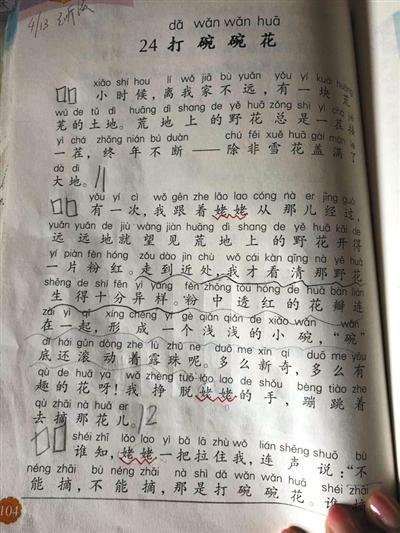语言和文字也应该求同存异
80、90后的朋友,对《打碗碗花》这篇文章应不会陌生。这是一篇多年之前就被列入学生课本教材的文章,事实上,这篇文章至今仍被收入在学生的课本教材里。
但近日,沪教版二年级第二学期语文课本中,出版社将《打碗碗花》一文中的“外婆”改为“姥姥”,引发“方言”争议。课本出版方上海市教育出版社就此发布声明称,更改系为落实该学段识字教学任务的需要,今后将充分考虑地域文化和语言习惯。
为何将课文中“外婆”一词改为“姥姥”,上海市教委的解释是,“姥姥”是普通话词汇,指“外祖母”,一般是在口语中使用较多。“外婆”、“外公”属于方言。
我出生和生长在北方,我媳妇是南方人,在我老家,虽然本地话叫“外婆”同普通话“外婆”不太一样,但文字和谐音都可以肯定是“外婆”这个词确定无疑。而我媳妇,回到老家时,叫自己的外婆也是如此,即便音同粤语"外婆"有点出入。至于“姥姥”一词,在我老家,反而指爷爷奶奶或外公外婆的上一辈,可见地区差异性,对“姥姥”的解释也有一定的差别,“姥姥”一词的代指可能会有所不同,但我从未听说过对“外婆”或“外公”词的叫法引起误解的,由此可见,“外婆”一词在称呼上比“姥姥”更准确、不会引起歧义,南北通用。
但我们也知道,在南方一些地方,的确有称呼“姥姥”的习惯,我们不能因为某个原因就强行让这部分人改“姥姥”称呼“外婆”,那样也是滑天下之大稽,没有意义的。事实上,生活中会存在很多类似的现象,语言是为了人们更好更方便的相互沟通,但我们也应该清楚地意识到,各地语言(方言)在多年来的发展中,继承了当地特殊文化、人文、风土等,存在的意义也远大于一些表面能看到的价值,不能因为一味地要求统一而改变这些特色,那样既无意义,也是缺乏思考的。
事实上,在群众一面倒的舆论声音下,处理意见也很快出台了:上海市教委教研室、上海教育出版社关于上海小学语文教材将“外婆”改“姥姥”一事向公众致歉。
这下“姥姥”终于恢复“外婆”的本来面貌了。

English Version Of This Awesome Article Written By Teacher @rivalhw!
Language and text should also seek common ground while reserving differences!
Friends after 80 and 90 should be familiar with the article “Have Bowling Bowl Flowers”. This is an article that was included in student textbooks many years ago. In fact, the article is still included in student textbooks.
However, in the recent Chinese textbooks for the second semester of the second edition of the Shanghai Education Press, the publishing house changed the “grandmother” in the article “Playing Bowls and Flowers” to “姥姥”, causing a dispute in the “dialect”. Textbook publisher Shanghai Education Publishing House issued a statement in this regard, saying that the change is to implement the scholastic teaching task of this section, and will fully consider the regional culture and language habits in the future.
Why the word "grandma" in the text was changed to "姥姥", the interpretation of the Shanghai Education Commission is that "姥姥" is a Mandarin vocabulary and refers to "grandmother", which is generally used in spoken language. "Grandma" and "Grandfather" are dialects.
I was born and raised in the north. My daughter-in-law is a southerner. In my hometown, although the local dialect is not the same as the Mandarin “grandmother” in the local dialect, the word “Harmony” is definitely certain. When I returned to my hometown, I called my grandmother the same way, even though the tone was a bit different from the Cantonese “grandmother”. As for the word “姥姥”, in my hometown, I mean the older generation of grandparents or grandparents, which shows regional differences. There are also certain differences in the interpretation of “姥姥”, and the word “姥姥” may refer to It is different, but I have never heard of the misunderstanding of the name "grandma" or "father". It can be seen that the term "grandma" is more accurate than "deafness" and does not cause ambiguity. North-South GM.
However, we also know that in some parts of the south, there is indeed a habit of calling “姥姥”. We cannot force people to “call” “grandmothers” because of a certain reason. This is also a big sneak sway. It does not make sense. of. In fact, there are many similar phenomena in life. Languages are for people to communicate with each other better and more conveniently. However, we should also clearly realize that local languages (dialects) have inherited local special cultures over the years. The significance of existence is far greater than some of the values that can be seen on the surface. It is not possible to change these features because they are demanding uniformity. It is meaningless and lacks of thinking.
In fact, under the voice of the public, the opinions of the public have quickly been issued. The Shanghai Education Commission's Teaching and Research Office and the Shanghai Education Press have apologized to the public about the changes to the “grandma” of Shanghai's primary school Chinese textbooks.
This time, "Yao" finally restored the original appearance of "Grandmother".
That's all from this Article. Another quality stuff for the community. Thanks @rivalhw for your great work. Always keep smiling and Stay Blessed!
《打碗碗花》有印象 感觉称呼“外婆”还是“姥姥”应该根据作者的习惯来吧 但是我已经不记得它的作者了 ^^
我长到十几岁才弄清楚姥姥是外婆而不是奶奶
哈哈哈
恭喜你!您的这篇文章入选 @justyy 今日 (2018-06-26) 榜单 【优秀被错过的文章】, 回复本条评论24小时内领赏,点赞本评论将支持 @dailychina 并增加将来您的奖赏。
Congratulations! This post has been selected by @justyy as today's (2018-06-26) 【Good Posts You May Miss】, Steem On! Reply to this message in 24 hours to get rewards. Upvote this comment to support the @dailychina and increase your future rewards! ^_^
我怎么感觉外公外婆很书面体啊?外婆和姥姥只是南北差异吧?
90后表示不懂
:)
最多加个注解,尊重原著真的很重要
对,这个画蛇添足了
要不是引起公众反应,估计还在那边信口雌黄“‘姥姥’是普通话词汇,指‘外祖母’,一般是在口语中使用较多。”而且之前有人问过教育局,给出的答案是“‘姥姥’是普通话词汇,‘外婆’是方言”的说法~无语!
我也是头一次听说“外婆”这个词是方言。。。
上海人飘过……
教委那帮孙子实在是闲的蛋疼
(ꏿ᷄౪ ꏿ᷄ ̨ )͞妈了个鸡
闲的X疼
我也正想说这个,闲的蛋疼,多少正经事不做,去改外婆!
:)